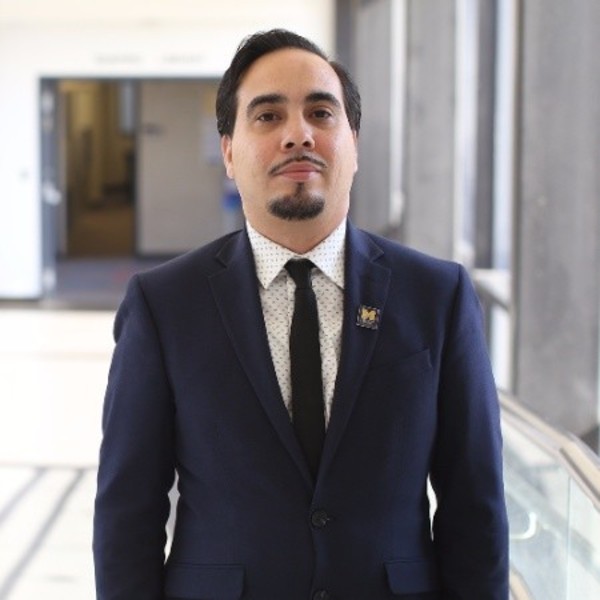Edras Rodriguez-Torres

"As an undergraduate student I had the opportunity to work on a digital collection that documented the history of a grassroots civil rights group. That experience spurred my interest in digital content management."
Q: What's your name? What semester/year did you graduate?
A: Hello, my name is Edras Rodriguez-Torres and I graduated with an MLIS in August of 2015.
Q: Where are you from originally? Did you move here to go to school?
A: I'm originally from Puerto Rico by way of Grand Rapids Michigan. I moved to Detroit to attend SIS and take advantage of the on-campus experience.
Q: What other degrees do you have and where are they from?
A: I have an Associate's degree from Grand Rapids Community College and a Bachelor of Arts in History from Grand Valley State University.
Q: Why did you choose Wayne State School of Information Sciences?
A: I chose SIS because of its fantastic reputation and its location.
Q: What area did you specialize in? Why?
A: I specialized in Digital Content Management. As an undergraduate student I had the opportunity to work on a digital collection that documented the history of a grassroots civil rights group. That experience spurred my interest in digital content management.
Q: Where/What format did you take most of your classes? Why?
A: I chose to take most of my classes online because of their availability.
Q: Were you active in any student organizations?
A: I was a member of ALA and a part of EMIERT (Ethnic and Multicultural Information Exchange Round Table).
Q: How did your involvement in student organizations impacted your SIS experience?
A: My involvement in ALA exposed me to many trends and issues of which I would not have been aware otherwise. It also gave me the opportunity to be eligible for, and be awarded participation in the 2015 ALA Student-to-Staff Program in San Francisco.
Q: What are you most proud of in your time as a student at SIS?
A: During my time at SIS I had the opportunity to work on many interesting projects and meet lots of wonderful people. Those experiences helped me to grow academically and professionally and that's what I'm most proud of.
Q: Is there a professor who has really impacted your journey into becoming a librarian or information professional?
A: Kim Schroeder was really influential during my time in the program. Her classes were always engaging and she is really knowledgeable. She also encouraged me to work on projects related to digital content management outside the classroom in order to gain hands-on real world experience.
Q: What do you feel is the most important or surprising thing you learned about the library and information science profession at SIS?
A: Although my perception of the profession was not limited to just that of the "traditional" librarian, I was really surprised how dynamic it truly is. LIS professionals work in all kinds of institutions and have so many different titles and roles. That is why it is important to keep up with current trends and techniques in order to be a flexible and forward thinking LIS professional.
Q: Do you feel that SIS prepared you for a career in the information profession? Any long-term professional goals?
A: SIS definitely prepared me for the profession. All of the things I've learned and the experiences I had during my time in the program encouraged and helped me to grow both academically and professionally. In the future I plan on pursuing my Ph.D. in History in order to further my research on the oral histories of the native peoples and immigrants of Detroit.
Q: What advice would you give to someone considering SIS as their LIS school?
A: My advice is to get involved! Whether it is student organizations, internships, or volunteer opportunities, getting involved is vital to your LIS education. It is truly the case that your degree and LIS education is what you make. Through these types of experiences you will learn about leadership and advocacy all while developing practical skills.